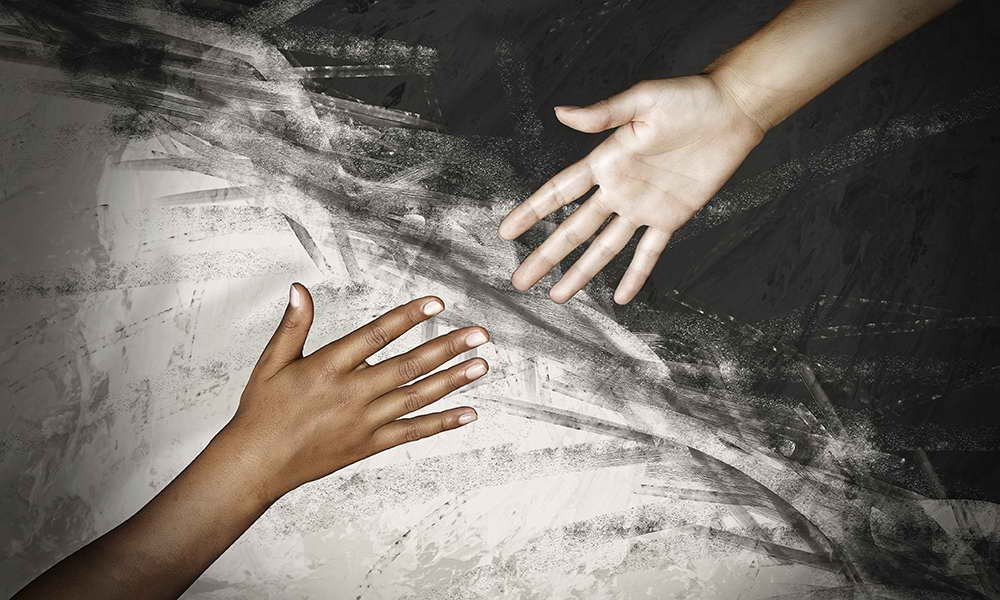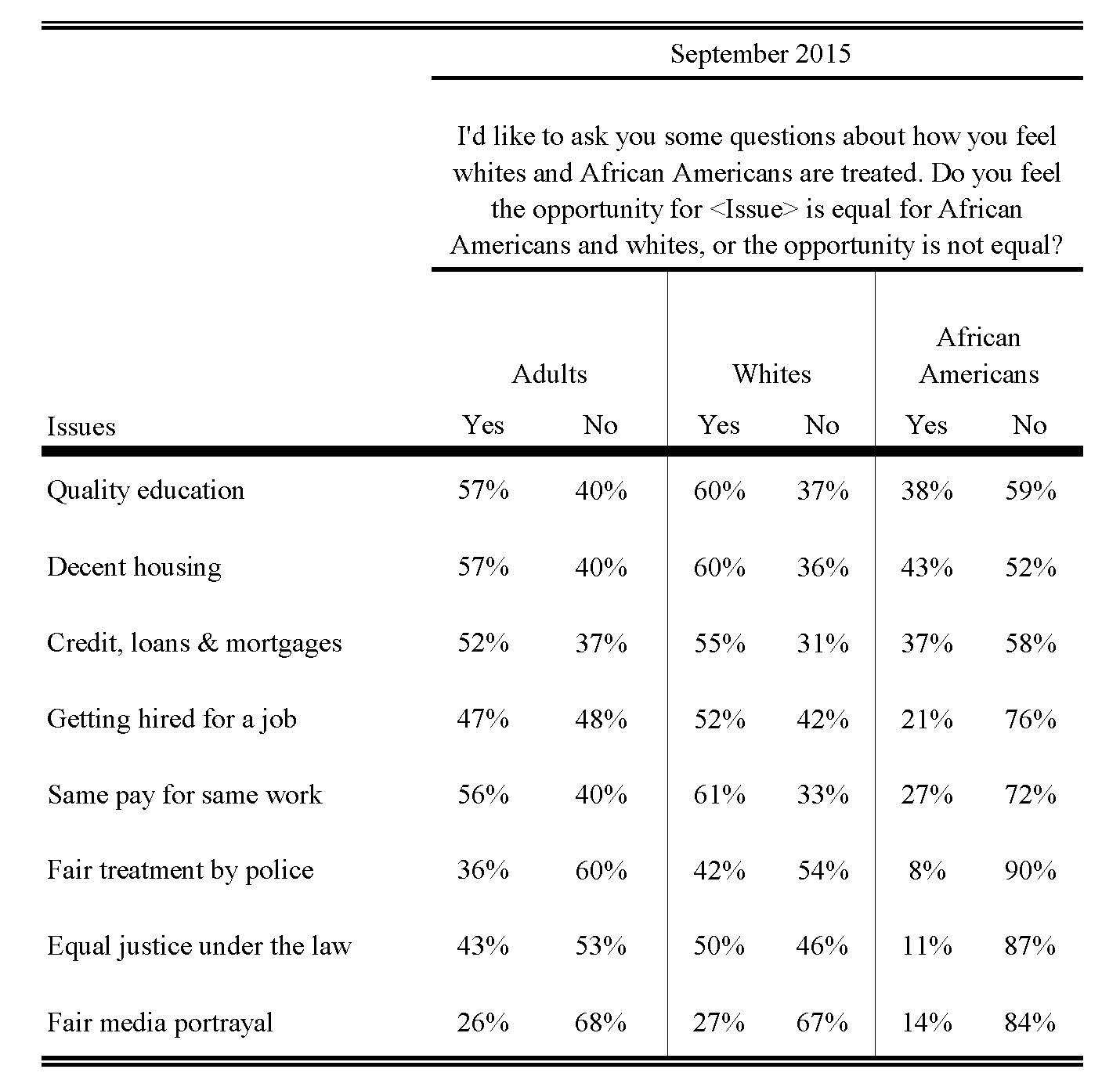September 22, 2015
9/22: Race Relations in the United States
Both white and African American residents nationally agree that race relations in the United States have deteriorated during the past year. But, the consensus ends there. This survey of Americans illustrates the contrast in opinions along racial lines about the opportunities available today for African Americans.
When looking at race relations close to home, most Americans think their local town or city, unlike the country, hasn’t changed much in the past year. But, white residents, by more than two to one, think that is a good thing whereas, by nearly two to one, African Americans view the status quo as a negative.
The opportunity to achieve a middle class life is at the core of the American Dream. But, race is a defining factor in whether or not Americans believe this is an attainable goal for African Americans. While a majority of whites, 52%, reports a middle class lifestyle is equally attainable regardless of race, six in ten African Americans, 60%, disagree, saying they have less opportunity.
A racial divide exists regarding perceptions of whether or not equal opportunity is available for whites and African Americans when it comes to education, housing, hiring practices, equal pay for equal work, and the availability to acquire credit. Although a wide disparity also exists between white residents and African Americans regarding fair treatment by police, the law, and the media, majorities of Americans, overall, believe inequality exists in these areas.
Non-white Americans are pessimistic about the future of race relations. Majorities of African Americans and Latinos think racial prejudice and discrimination will always exist in the United States. A slim majority of Americans believe having a president who is African American helps race relations in the country.
Nearly two-thirds of African Americans mostly agree with “Black Lives Matter.” They believe it is a movement not just a slogan, focuses attention on real issues of discrimination, and is a non-violent civil rights campaign. In contrast, 42% of whites are either unsure or do not have an opinion about “Black Lives Matter.” A plurality of whites thinks it is a movement, but nearly six in ten believe that it distracts attention from the real issues of discrimination, and they divide over whether it advocates violence or is a non-violent civil rights campaign.
When it comes to campaign 2016, Americans, regardless of race, believe too little attention is being paid to the economy. A majority of whites and a plurality of African Americans would like to see more discussion about foreign policy. But, a majority of African Americans believes too little attention has been paid to race relations in the presidential campaign so far. In contrast, a plurality of Latinos think there has been too much discussion about immigration. Overall, a plurality of Americans think having a Democrat as president will improve race relations in the country.
The confederate flag is a racially polarizing symbol. A majority of white residents, 58%, characterize it as a source of southern pride compared with 67% of African Americans who describe it as a symbol of racism. Nationally, Americans divide over whether the Civil War was fought to abolish slavery or to defend states’ rights. A majority of African Americans believe slavery was the main reason for the war. Whites divide.
Where do Americans stand on gun control? Regardless of race, majorities of Americans favor federal laws which require registering guns, regardless of where the guns were purchased.
Complete September 22, 2015 PBS NewsHour/Marist Poll of the United States
Poll points:
- 58% of Americans, including 60% of whites and 56% of African Americans, say race relations in the United States have worsened in the last year. While 30% of residents nationally perceive race relations to have stayed the same, 20% of Americans with this view believe that lack of change is a bad thing.
- African Americans, 60%, are less likely than whites, 74%, to say race relations locally have not changed. But, 37% of African Americans describe the lack of change as a negative whereas 48% of white residents describe the status quo as positive.
- 51% of Americans think African Americans have the same opportunity as whites to achieve a middle class lifestyle. 38% believe African Americans have less of an opportunity to do so, and 10% report African Americans have more of an opportunity to become middle class. A majority of whites, 52%, believe African Americans have the same chance to be middle class while 60% of African Americans think they have fewer opportunities to achieve middle class status.
- Views about the specific opportunities available to whites and African Americans also widely differ based on race.
- A majority of non-whites, 54%, are pessimistic about ending racial prejudice and discrimination in the future. 43% say there is hope of doing so in the long run.
- 51% of U.S. residents, including 61% of African Americans, 54% of Latinos, and a plurality of whites, 47%, say having a president who is African American helps race relations in the United States.
- When compared with another movement in the United States, Americans are more than two times as likely to agree with “Black Lives Matter,” 34%, than the Tea Party, 16%. African Americans are much more likely to agree with “Black Lives Matter,” 65%, than the Tea Party, 4%. 31% of white residents agree with “Black Lives Matter,” 27% disagree, and 42% do not offer an opinion or are unsure. This compares with 20% of whites who agree with the Tea Party.
- 48% of Americans, including 67% of African Americans, say “Black Lives Matter” is mostly a movement. 39% of adults nationally describe it mostly as a slogan. Among whites, 46% call “Black Lives Matter” a movement while 40% say it is a slogan.
- 55% of Americans, including 59% of whites, say “Black Lives Matter” distracts attention from the real issues of racial discrimination. Nearly two-thirds of African Americans, 65%, disagree and believe it focuses attention on the real issues of discrimination.
- 50% of U.S. residents, including 82% of African Americans, perceive “Black Lives Matter” mainly as a non-violent movement. 35% of Americans, though, think it advocates violence to make its point. Among white residents, 43% consider “Black Lives Matter” to be a non-violent civil rights campaign while 41% say it advocates violence.
- 64% of Americans, including 73% of African Americans and 63% of whites, say too little attention has been given to the economy in the presidential campaign.
- 52% of adults nationally, including 55% of whites and 45% of African Americans, report too little attention has been given to foreign policy in the presidential contest.
- Americans divide about whether or not the right amount of attention has been given to the issues of race relations and immigration. However, 56% of African Americans believe too little attention has been given to race relations in the presidential campaign, and 42% of Latinos believe there has been too much attention on immigration.
- 46% of Americans think a Democrat would be better to have as president on the issue of race relations, including 74% of African Americans and 59% of Latinos. 28% of Americans believe a Republican president would do a better job. A notable 26% are unsure.
- 52% of Americans, including 58% of whites, think the confederate flag is a symbol of southern pride. 38%, including 67% of African Americans, see it as a symbol of racism.
- When it comes to the underlying cause of the Civil War, 43% of Americans say states’ rights was the reason for the war, and 42% believe slavery was the source. A majority of African Americans, 54%, cites slavery. Among whites, 44% think states’ rights caused the conflict while 41% believe slavery was the basis for the war.
- 61% of Americans, including 73% of African Americans, 61% of whites, and 57% of Latinos support federal laws which require all people to register guns, regardless of where they were purchased.



